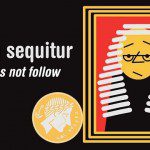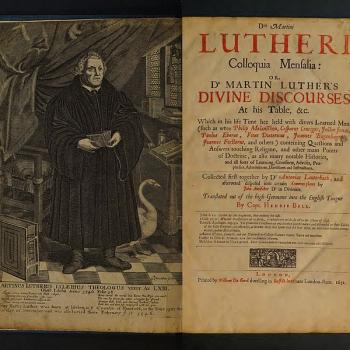Refutation of Anti-Catholic Polemicist & Reformed Protestant Pastor David T. King

*****
You have never tried to defend the Roman dogma of the assumption of Mary, and you know very well that many of your communion’s scholars would never attempt to do so from Holy Scripture.
I wouldn’t be so sure about it. I am merely a lay Catholic apologist and no scholar and I took a crack at it. I’m sure far greater minds than mine have (at least in the way I will outline later on).
The Roman response here is typical, cut and paste anything that remotely appears to be a response to the issue at hand.
Just for the record, showing the usual sweeping King attack on large masses of people. We shall see how he responds to these criticisms of his arguments. If experience is any guide at all, I would strongly advise anyone waiting eagerly to see what King will do with my reply to not hold your breath (or if you insist on doing so, to be sure to have a very good life insurance policy).
The retreat to material sufficiency on the part of any Roman Catholic is but an exercise of private judgment, because your communion has nowhere officially spoken authoritatively on the relationship of Scripture to tradition.
It has spoken a lot on the relationship per se, but it has not required Catholics to believe in the material sufficiency of Scripture or to deny it. We have freedom to believe either. The majority position among scholars is the former.
I know you know this because I’ve told you repeatedly in the past in personal conversations. You know very well that a dogma like the assumption bears no scriptural support, not even implicitly.
I don’t know what Mr. Waltz knows “very well”, according to you. But I know that I believe there is considerable implicit support, as I shall show in due course.
Your present pope, as a cardinal, is on record as having denied material sufficiency…
Cardinal, now Pope Joseph Ratzinger, while commenting on the documents of Vatican II (article nine of Dei verbum), stated that “no one is seriously able to maintain that there is a proof in Scripture for every catholic doctrine.” See Joseph Ratzinger’s “The Transmission of Divine Revelation” in Herbert Vorgrimler, ed., Commentary on the Documents of Vatican II (New York: Herder and Herder, 1969), Vol. 3, p. 195.
He could very well mean that there is not explicit or clear support for every doctrine, which is obvious, and which I would readily agree with.
Though he argues for material sufficiency, Cardinal Yves Congar states concerning examples of Roman tradition: Certainly it would be impossible to prove in every case a truly apostolic origin; it is not even impossible that the contrary could be proved. Yves M.-J. Congar, O.P., Tradition and Traditions: An Historical Essay and A Theological Essay, trans. Michael Naseby and Thomas Rainborough (New York: The MacMillan Company, 1966), p. 62.
In the sense of strict historiography, this could be asserted, yes. This causes no difficulty for the Catholic position.
. . . a dogma like the assumption has neither material support in Holy Scripture, nor in tradition. . . . Why even bother to appeal to material sufficiency or tradition, when neither can support a dogma like the assumption? . . . But I know, and you know, that the assumption is nowhere taught in Holy Scripture, and your alleged support for the material sufficiency of Holy Scripture is but wishful thinking, and a ruse to distract from the fact that you’ve really embraced the principle of sola ecclesia. . . . you know that your own theologians have declared it has no support in Scripture, . . .
At this point (after Pastor King has presented his basic argument that he will now mostly repeat over and over like a mantra) it would be very useful to do a quick survey of just exactly what a Catholic means when they refer to material sufficiency of Scripture. I shall contend that Pastor King doesn’t understand nuances in how a Catholic views this matter: qualifications that make a big difference regarding whether our belief in the dogma of the Assumption would contradict our conception of material sufficiency. If one uses Pastor King’s incorrect definition, his conclusion would arguably follow. But once the correct definition is understood, it is seen that King’s conclusion doesn’t follow because his assumed premise (of definition) is false.
Catholic apologist Jimmy Akin provides a very helpful overview: in his article, “The Complex Relationship between Scripture and Tradition”:
As the Second Vatican Council stressed in its constitution Dei Verbum, “It is not from Sacred Scripture alone that the Church draws its certainty about everything that has been revealed. Therefore both Sacred Tradition and Sacred Scripture are to be accepted and venerated with the same sense of loyalty and reverence” (DV 9).
One of the principal architects of Dei Verbum was the French theologian Yves Congar, who thought Catholics could acknowledge a substantial element of truth in sola scriptura.
He wrote that “we can admit sola scriptura in the sense of a material sufficiency of canonical Scripture. This means that Scripture contains, in one way or another, all truths necessary for salvation” (Tradition and Traditions, 410).
He encapsulated this idea with the slogan Totum in scriptura, totum in traditione (“All is in Scripture, all is in Tradition”), which he attributes to Cardinal Newman. According to this theory, Scripture and Tradition would not be two sources containing different material but two modes of transmitting the same deposit of faith. We might call it the “two modes” view as opposed to the “two source” view.
The decrees of Trent and Vatican II allow Catholics to hold the two-mode idea, but they do not require it. A Catholic is still free to hold the two-source view.
. . . Congar spoke only in terms of the Bible containing “all truths necessary for salvation.” He did not speak of it containing all theological truths. This is an important distinction that comes up in discussions of sola scriptura.
Protestants often define sola scriptura by appealing to the idea that Scripture contains all truths needed for salvation. In practice, though, they often apply the term much more expansively, as if the Bible should be expected to contain all truths of Christian theology.
. . . I certainly can’t think of any truths directly connected with salvation that aren’t at least alluded to in Scripture. But if we apply it more broadly, problems emerge. There seem to be theological truths that are not mentioned in Scripture. For example, the Bible does not state that public revelation is closed. As far as I can tell, it is neither stated nor clearly implied. Nor does the Bible say that God will not inspire any more books of Scripture or that there will be no more apostles. One needed to be a witness of the ministry of Christ to be a member of the Twelve (Acts 1:21-22), but Christ appeared in a vision to name Paul an apostle, even though he was not an eyewitness. If he wanted, Jesus could have kept appearing to people throughout history and appointing them apostles. We know from Tradition that this didn’t happen — that the apostles died out and handed the Church over to their successors, the bishops — but the Bible doesn’t tell us this. . . .
Other truths of Tradition are not stated directly in Scripture but are implied clearly by the biblical author. For example, while the Bible doesn’t come out and say that the Holy Spirit is a person rather than a force, it is implied in numerous passages, such as those in which the Spirit is depicted as speaking to people (e.g., Acts 13:2), and the biblical authors meant us to understand this.
Some truths of Tradition can be inferred from Scripture even though the biblical authors did not clearly imply them. For example, Christ having both a human will and a divine will can be inferred from his being “true God and true man” (CCC 464). Various biblical passages state or imply that he is true God and true man, but in none does the biblical author state or imply that he had two wills. We have to figure that out by inference.
A truth is sometimes alluded to or reflected in the text even though it can’t be proved from the text alone. The Immaculate Conception may be reflected in what Gabriel says to Mary in Luke 1:28, and the Assumption may be reflected in the wings the woman is given in Revelation 12:14, but you couldn’t prove these truths from the text alone.
Ironically, Pastor King radically contradicts himself (apparently without even knowing it) in his book, Holy Scripture: The Ground and Pillar of Our Faith, Volume I: A Biblical Defense of the Reformation Principle of Sola Scriptura, by stating on page 129 (emphases added):
“Scripture alone is the only certain, infallible norm by which all theology, doctrine, creeds (beliefs), practice and morality of the Christian Church is to be regulated, in accordance with that which is ‘either expressly set down in Scripture, or by good and necessary consequence may be deduced from Scripture‘…”
Now, think for a moment, the implications of this, and the vicious logical circle that will result. He demands of Catholics that they must find explicit support for the assumption of Mary in Scripture, lest they contradict their belief (i.e., for those who hold it, since it’s not required) in material sufficiency of Scripture.
But yet when it comes to his pet doctrine of sola Scriptura, King freely admits that it may be simply deduced from Scripture (!!). Well, if it is the case for this “pillar of the Reformation” — upon which all distinctively Protestant doctrines are built –, that King allows mere deduction, then we must point out that this is, of course, exactly how the Assumption can also be indicated in Scripture. Thus, it follows that King’s position logically forces him to concede that the biblical evidence for the Assumption is not fundamentally lesser in kind than the biblical evidence for sola Scriptura. This is what we call a double standard, if he continues to press the supposed huge difference where it, in fact, does not exist.
King is not alone in implying that the Bible doesn’t contain explicit proof for sola Scriptura. Protestant apologist Norman Geisler admits:
[T]he Bible does teach implicitly and logically, if not formally and explicitly, that the Bible alone is the only infallible basis for faith and practice.
(Roman Catholics and Evangelicals: Agreements and Differences, co-author, Ralph E. Mackenzie, Grand Rapids, MI: Baker Books, 1995, 184; emphases added)
He denies that there is either “formal” or “explicit” biblical proof for this foundation of Protestant theology and its very rule of faith. So if even sola Scriptura lacks this sort of biblical proof (and I would also deny that one can find even implicit or logical proof for it in Scripture), why is it required of Catholics to provide more for a doctrine like the Assumption? There are such things as “implicit” and deductive proofs from Scripture or at least indications.
So how does one find implicit or indirectly deduced support for the Assumption in Scripture? There are a number of ways to do this. For example, in my apologetic efforts I have maintained that the key component of the Immaculate Conception of Mary (sinlessness) is explicitly taught in Luke 1:28. By making a straightforward, deductive biblical argument, the Immaculate Conception (in its essence) can be strongly supported. There are many other arguments as well. My section: “Scriptural evidence: the Immaculate Conception of Mary” in my book A Biblical Defense of Catholicism, ran 15 pages; filled with biblical arguments.
This has implications for the Assumption. If Mary indeed was preserved from original sin, then she would not undergo decay (i.e., she would be in a state or condition that held sway before the fall of man; see Gen 3:19; Ps 16:10). Therefore, when she departed this life, she would experience bodily resurrection immediately without her body undergoing decay. From one thing follows the other. If one is completely without sin, this arguably includes original sin, and without original sin, there is no decay; ergo, the Assumption follows as a matter of course.
Another deductive biblical argument for the Assumption of Mary is regarding her as the firstfruits of the general resurrection that St. Paul discusses in 1 Corinthians 15. What better person to follow Jesus in resurrection than His own mother, who made the way of salvation possible at the Annunciation? Though this is no ironclad proof, on the other hand, it is a very plausible scenario, and contradicts nothing in the Bible.
Yet another indirect way is to contend that the notion of an Assumption itself is not at all a foreign concept in Scripture. It’s not ruled out at all, based on the analogies of many other saints. I cite my book, A Biblical Defense of Catholicism, p. 190:
Lest one think that a bodily ascent into Heaven (of a creature, as opposed to Jesus) is impossible and “biblically unthinkable,” Holy Scripture contains the examples of Enoch (Heb. 11:5; cf. Gen. 5:24), Elijah (2 Kings 2:1,11), St. Paul’s being caught up to the third heaven (2 Cor. 12:2-4), possibly bodily, and events during the Second Coming (1 Thess. 4:15-17), believed by many Evangelicals to constitute the “Rapture,” an additional return of Christ for believers only. All these occur by virtue of the power of God, not the intrinsic ability of the persons.
Recently, I realized that another biblical passage (the “Two Witnesses”) was an additional example of a sort of Assumption:
9: For three days and a half men from the peoples and tribes and tongues and nations gaze at their dead bodies and refuse to let them be placed in a tomb,
10: and those who dwell on the earth will rejoice over them and make merry and exchange presents, because these two prophets had been a torment to those who dwell on the earth.
11: But after the three and a half days a breath of life from God entered them, and they stood up on their feet, and great fear fell on those who saw them.
12: Then they heard a loud voice from heaven saying to them, “Come up hither!” And in the sight of their foes they went up to heaven in a cloud.(Revelation 11:9-12; cf. Matthew 17:27:52-53)
Another biblical argument used regarding Mary’s assumption is the “woman clothed with the sun” passage in Revelation 12, which has obvious connections to Mary as well as to the Church (it has a double application).
Think of these what a person will, they are at least biblical arguments, and not too different in kind from those used to “prove” that the Bible teaches that it is the only final authority. And there is much in the Bible that flat-out contradicts sola Scriptura (indications of binding tradition, authoritative oral tradition, apostolic succession, strong Church authority, the papacy, Holy Spirit-led councils: the council of Jerusalem, etc.), whereas nothing in Scripture contradicts the possibility of Mary being assumed into heaven (and many parallels show it to be entirely possible and plausible).
All your pontifications about material sufficiency doesn’t mean a thing to me while you avoid the particulars like “the assumption.”
I saw Mr. Waltz give plenty of argumentation. If he didn’t, however (if we grant Pastor King’s claim), I certainly have. So let King scold others for (actually or supposedly) avoiding his arguments, while we observe what he does with the arguments I make in direct reply to his.
I am not going to let you get away with this tactic again. I am not being mean or uncharitable to hold your feet to your own professed belief by insisting that you make it good on a particular case. You see, as long as folks such as yourself can get away with speaking in generalizations, and never deal with the problems of the particular, it all sounds plausible. But the moment your theory is subjected to the particulars, it begins to unravel. . . . Mr. Waltz, it is charitable to hold you to your own principles. I am not going to let you off the hook by permitting you to speak in generalizations, all the while avoiding the particulars, because that is where your theory begins to unravel.
I’m delighted to extend the same sort of charity to Pastor King himself. Funny thing, though, his behavior in similar situations in the past hasn’t particularly struck me as indicating that my critiques were acts of charity towards him! In fact, quite the contrary. His fleeing for the hills and sudden symptoms of “clamming up” would seem to imply to me that he was a bit uncomfortable with all my expressed charity. Impressions are sometimes somewhat misleading, though, I confess.
For a Roman Catholic to attempt to hold to or argue for the material sufficiency is, in my opinion, an exercise of sophistry. Why? Because your best exegetes . . . recognize that the Assumption is not a development from the text of Holy Scripture.
One must look at what sense they intended when they said this. I suspect that most of them had in mind what I have been expressing, rather than King’s mistaken understanding of material sufficiency. After citing four writers: including two Protestants and a liberal Catholic, King concludes:
This is a glaring, unresolved consistency for any Roman Catholic professing to hold to the concept of material sufficiency. The dogma is absent in Scripture and tradition, but must be maintained by the “faithful” because Rome requires it. These men are neither stupid nor biased. They are being honest, and that’s why I regard it as an exercise of sophistry for a Roman Catholic to affirm a concept of “material sufficiency” on the one hand, while a dogma like the “assumption” defies it on the other.
I have found more indication for the Assumption in Scripture, I contend, than can be found for sola Scriptura. It’s also true that the canon of Scriptura is, of course, nowhere found in Scripture itself, and it is necessary to know in order for sola Scriptura to be able to be practiced. So the belief that Scripture is the only infallible authority itself rests upon an unquestionable tradition determined ultimately by the Church. Students of logic will surely recognize this as a vicious circle; whereas the assumption entails no such logical contradiction. It is simply an instance of indirect deductions from Scripture.
So, no, I don’t know that “the Assumption is theological development from an implicit reference in Holy Scripture.” I know the claim, but I think it is pure sophistry, and it’s not uncharitable for me to state my conviction as such. What should be questioned is your assertion that it is an “an implicit reference in Holy Scripture,” while at the same time confessing you haven’t done much study on it.
Wonderful; now that Pastor King has seen some of the arguments Catholics produce on that score, surely he will be excited to interact with it, no?
You’re the one arguing for material sufficiency, and you have yet to demonstrate, and I know you can’t, where it is found in Scripture.
This is symptomatic of the incomprehension of the proper definition of material sufficiency, highlighted above . . .
The fact remains that you still haven’t shown that the dogma of the “assumption” is materially derived from Scripture.
Like I said, Pastor King eventually simply repeated himself over and over, like a dog who keeps barking and barking, and the sound never changes.
There is no development for the “dogma” of the assumption that finds material support in Holy Scripture. Your own communion have never defined the “relationship between Scripture and tradition” and many Roman Catholic theologians from the past denied material sufficiency. I’m sure you don’t know what material sufficiency means, because you think you can believe it and the dogma of the “assumption.” The two beliefs are incompatible.
Ditto.
Why pursue the question of material sufficiency with me, when you know very well your own communion has avoided that question like the plague ever since the days of Newman or Vatican II.
It has? Wow; I didn’t know that . . .
We disagree again on both Ratzinger and Brown. I don’t care what they said in other contexts. I know what they said in the statements I gave.
This is a scream! “Don’t confuse me with the facts! And above all, I must never take into consideration the context of a writer’s overall thought, lest the entire thesis of my book collapse in a heap, because I started hunting down when all these fathers also talked about Tradition, the Church, the Pope, Councils, and apostolic succession. Circular reasoning and heads in the sand at the proper moments must rule the day!”
I wish I had a nickel for every time a Roman Catholic told me that I don’t understand this or that.
He would be a rich man indeed. I wish I had a penny for every time King and other anti-Catholics have fled from my critiques of their materials and refused to utter one word in defense of their critiqued materials. I’d be the richest man in the history of the world: more than Croesus and Bill Gates combined, times twenty.
But, again, for all of your comments, for all of your verbiage, we have yet to see a single passage of Scripture from you that demonstrates the dogma of the “assumption” has any material support from Scripture.
And I have started passing over some of King’s innumerable droning repetitions of this same theme. I don’t even want to ponder the repetition that must occur in this man’s sermons. His congregations must know them word-for-word by now if he uses at all the same technique he does here.
I refuse to grant what has not been proven, namely, that a Romanist can consistently hold to the view that Scripture is materially sufficient. . . .
For if the dogma of the “assumption” may be proven from Scripture, then virtually anything may be proven by this kind of “name it/claim it” approach to Holy Scripture.
Okay, how about reincarnation, seances, Mormonism, Christian Science, and Jehovah’s Witnesses? Are all those part of the “virtually anything” that is as harmonious with Scripture as the Assumption? I can easily show how all of them (and sola Scriptura as well) contradict Scripture repeatedly. But can King show us how the Assumption is contrary to Scripture, in terms of possibility and consistency with the biblical worldview?
*****
Meta Description: Extensive examination of an alleged contradiction: Mary’s Assumption in relation to the material sufficiency of Scripture.
Meta Keywords: David T. King, Assumption of Mary, material sufficiency of Scripture, rule of faith, sola Scriptura, Catholic Mariology, Mary in the Bible

















